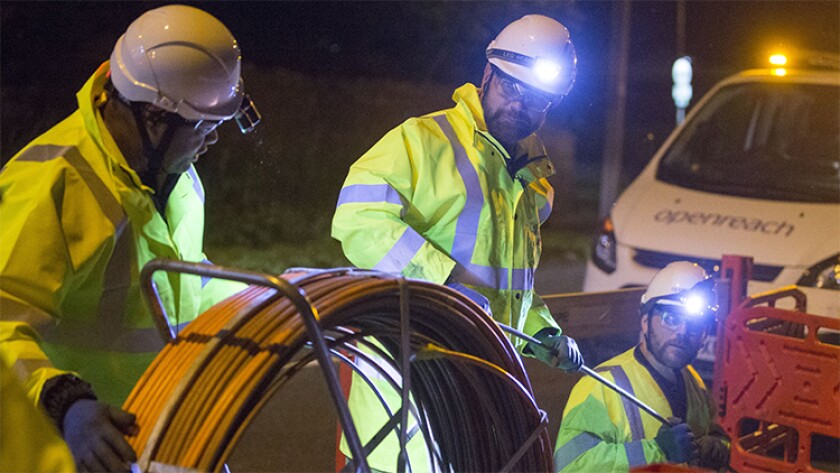Some operators say there is no problem – making it Schrödinger’s fibre shortage: it exists and it doesn’t exist, just as Schrödinger’s cat is alive and dead at the same time. But some are definitely alarmed.
In the US, fibre-to-the-home (FTTH) is being boosted by $130 billion coming from a number government funds, including the Investment in Infrastructure Jobs Act, putting pressure on supplies.
Gary Bolton, president and CEO of the Fiber Broadband Association (FBA) in the US, said: “It’s not a supply issue, it’s a demand issue.”
In Europe, a senior government official told Capacity within minutes of receiving our inquiry: “The rumours are true. Demand is exceeding supply.”
But Kai Schmidt, Deutsche Telekom’s VP of transport – who is at ITW – said: “We haven’t experienced any issues of delivery at the moment.”
Stefaan Vanhastel, Nokia’s CTO for fixed networks, told Capacity that the company’s revenue from fibre is up 35% year-on-year. Demand has been boosted, he said, by “the emergence of infrastructure investors, companies that build highways and train tunnels” bringing money into the industry.
Fergus Innes, chief commercial officer of Crosslake Fibre, which operates a Canada-US cross-border network, said: “We are conscious of this issue which is adding to a list of challenges.”
It’s one reason the company’s next North American project, the Maple Leaf Fibre from Toronto to Montréal, will be “a full terrestrial build” instead of partly submerged on the bed of Lake Ontario.
The shortage is extending lead times, said Bolton at the FBA. “We are seeing 52-week lead times,” he told Capacity. But that fits with the lead times that operators need to apply for and gain government grants. “By 2023 we’ll be back to normal,” said Bolton.
He and others pointed to shortages of materials other than glass itself causing the problem. “We are seeing fibre cable shortage due to supply issues with resin, needed for the cable construction,” said Bolton.
An executive of a big European user, who didn’t want to be named, said: “Russia is a major producer of helium which is used in the glass drawing process for fibre production.” This person quoted one vendor as saying the price of helium has gone up eightfold, with knock-on effects on fibre costs.
A major European user of fibre, which is building FTTH networks, said: “There may be a number of things happening in the downstream elements of the fibre production process, which are fuelling speculation.”
Jeff Denworth, CMO and co-founder of New York-based Vast Data, which is developing advanced flash storage for high-performance networks, has noticed supply-chain shortages throughout the technology industry, but says of optical fibre, “that’s the worst”. One company he deals with now has an 18-month lead time.
Covid has had its own effect on technology supply chains, said Denworth. “High-performance networks have a long lead time just to manufacture,” he said. “There’s been a Covid rush to build cloud data centres.” And they need fibre. “A lot of bad judgments were made, compounded by Covid.”
Another senior executive, who is a director of a UK-based rural fibre company, said: “There’s a growing shortage of pretty much everything, to be honest.”
This person said: “We have had issues sourcing certain diameter of ducting and everyone has had issues to a lesser or greater extent sourcing opto-electronic kit which has already had hugely increased lead times due to component shortages. On top of this we also have the significant inflationary pressures.”
Another rural UK FTTH company said they were troubled by a shortage of telephone poles.
Ibrahim Gedeon, CTO of Canadian operator Telus, said: “Supply chain issues [are] universal,” and said operators are responding by moving into planning cycles longer than a year.
“I would not single out fibre, where we planned properly and moved from months to 18+ months.” Now Telus has “no issues”, said Gedeon, adding: “I think [it] will take a year or two to normalize.”
“This is a real problem indeed,” said Martijn Blanken, CEO of Exa Infrastructure.
Paul Terry, Colt’s head of fibre engineering, told Capacity: “There’s definitely strong demand for fibre worldwide nowadays, with the ongoing boom of new networks and expansions. This, in combination with the recent chip shortage triggered by Covid-19, could be a cause for current concern.”
He added: “We pre-purchased some extra fibre last year to protect inventory at Colt, but this was because we anticipated price increases rather than any direct threat of low supplies.”
But, said Terry, “a lack of raw material could impact fibre production which, coupled with slow delivery times, could lead to shortages. At Colt, we constantly watch what is happening to ensure we are one step ahead so we can serve our customers with high quality fibre.”
Orange, on the other hand, said: “We put measures in place to secure sourcing of optical fibres and we have not encountered any specific difficulties with optical cable supply today.”
Hannah Britt, senior director of marketing at euNetworks in London, reported nothing “beyond supply chain lags that have been typical over the last year or so, as have been experienced in many industries”. She added: “We manage that with our vendors by providing trusted forecasts and close planning.”
In the UK, the government’s Trade Remedies Authority (TRA), set up last year, is investigating alleged dumping of fibre by China.
TRA chief executive Oliver Griffiths said in April: “Fibre optic cable is broadband’s workhorse. These investigations will examine whether fibre optic cable from China is being traded unfairly and assess its impact on the UK economy.”
The TRA said it will carry out two investigations – an anti-dumping investigation to determine whether imports of these products are being dumped in the UK at prices below what they would sell for in their home country and a separate investigation to determine whether the Chinese imports entering the UK market are also benefiting from subsidies which lower their production costs.
The investigations will also consider whether these imports are damaging the UK industry for fibre optic cables, said the TRA.






